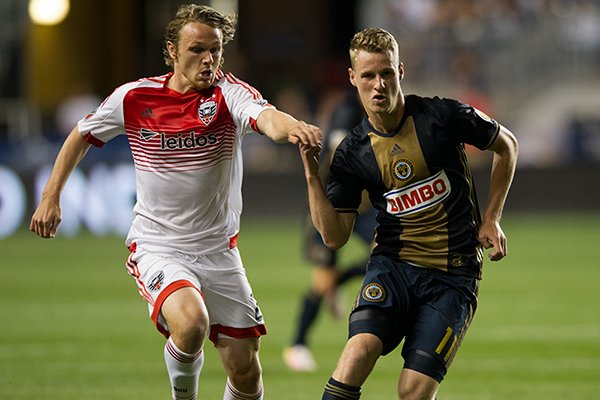
June 22, 2016
 Earl Gardner/Philly Soccer Page
Earl Gardner/Philly Soccer Page
Union rookie striker Fabian Herbers is in line for his second-straight MLS start on Wednesday night.
In the short term, the absence of C.J. Sapong is probably more important than the unexpected changes to the Philadelphia Union's midfield corps.
With all of the chatter surrounding the shock departure of Vincent Nogueira, talk of Sapong's ankle injury was relatively non-existent. The Union's starting center forward has been on the shelf since June 1st, participating only in solo activities while sitting out group exercises.
Fortunately for Sapong and the Union, this injury took place right before the Copa America break.
It's almost certain that rookie Fabian Herbers will make his second straight start on Wednesday night. Herbers had a tough experience in New York, finishing the game with zero shot attempts but contributing an earned penalty for his side.
The insertion of Herbers for the injured Sapong doesn't change the Union shape or system. It's still going to be the tried and true 4-2-3-1 that we've seen throughout manager Jim Curtin's tenure.
The strikers are, however, two completely different players. Whereas Sapong is a prototypical center forward with expert holdup play, Herbers is a guy who likes to get behind the defense and look for gaps and seams to attack.
"C.J. is a big guy, holding the ball really well and winning headers against tall defenders," Herbers said after training this week. "I’m more of a dynamic guy, I would say. I like to go in behind a defense and make my runs in there. So that’s the major difference I would say."
Herbers scored his first Union goal in the June 1st win against Columbus. He earned his first assist in the game prior, which was the 1-1 draw in Colorado.
During his last year in college, Herbers scored 15 goals and added 17 assists over the course of 23 games. The production was there, but the system was different.
"At Creighton, we did play with two forwards," Herbers explained. "You can always switch one off, one who comes deep in midfield and whoever makes the run in behind. So I did a little of both at Creighton. Here, I’m glad to be the one up top. I can play it and be strong up top. I try to draw fouls and make the runs in behind, so I think I can help the team."
We don't have a huge sample size of Herbers game footage, at least not against MLS opposition. He has, however, played a lot of minutes for Bethlehem Steel, so we've seen enough to understand his on-field tendencies and habits.
In this clip, the build-up begins on the right side, then Ilsinho plays a smart ball behind the defense. Herbers is hovering on the back shoulder of the right center back, and pounces on the pass while staying onside. Unfortunately, his touch takes him wide of the goal, and he can only square it back for a blocked Ilsinho effort.
That's one of the things you'll see Herbers do more frequently than Sapong.
For C.J.'s skill-set, this clip is a good explainer.
Sapong excels at occupying defenders and making them uncomfortable, but the key to his holdup game is that he really works hard to "finish" the play. In this example, he's able to knock down the ball for a teammate, then turn and get himself back into a scoring position. He pulls off these kinds of plays better than any other forward in MLS.
Curtin explained the difference between his strikers during his weekly press conference.
"Fabian, he is good in the air," Curtin said. "He does time things well, and he jumps different than C.J. maybe does. CJ likes to have the contact, he likes to feel a center back up his back. Fabian likes to play in their blind spots. So, when you see Fabian jump for headers — for example, the one he gets on (Axel Sjöberg against Colorado), he comes from the side where they don’t see you. That’s difficult to deal with as a defender. I would say they’re…I like both their skill sets, you know? I won’t say one way is better than the other, but C.J., certainly his game is about contact, feeling another player, kicking him, having him get kicked, and fighting, whereas Fabian’s more (about) movement into the defender’s blind spot and movement into space. He looks to combine more, maybe, with the ball at his feet. Whereas C.J. kind of holds it and lets us move up, Fabian’s looking for little one-twos and combinations. So, both are good; I think it’s a good change of pace."
For another set of comparisons, take a look at the goal that Herbers scored against Columbus. This one starts with a hard diagonal between the defenders, then a sharp cut and curler into the upper corner.
"WHAT A BEAUTY!"@fherbers9393 opens his account in style. #PHIvCLB https://t.co/q3L28N3pt4
— Major League Soccer (@MLS) June 2, 2016
Sapong would probably have tried to feed that ball back across the box. He definitely isn't the type of guy who will make that hard pivot and pick out the far post. That's a sniff of what Herbers can do, and it ended up being the game winner.
To flip the script, and point out another difference, here's something Herbers probably wouldn't do:
This is superb holdup play from Sapong. He moves into his own half of the field, shields a defender, and allows his teammates to get into a better attacking position. Chris Pontius finished the play with a great goal.
All differences aside, Curtin has been extremely complimentary of his strikers all season long.
"I like the idea of getting them both back and getting them going now that Fabian’s gotten a taste as a starter," the manager said. "I think it’s important. Fabian has a high fitness level, his tank is good, but For MLS games, it's harder, you know? He’s played 90 minutes for the Steel a bunch, and that’s been really helpful. But, now to go 90 minutes against New York City, it got to about 80 and he started to cramp a bit. So, again, there is an adjustment period; a young player, the tempo is fast. But, I was happy with the chances he created against New York, especially in the second half. He makes good decisions around the goal; we need to get him service and get him looks. But, his goals will mostly come from his movement in the box, whereas C.J.’s more about brute force, the kind of (guy who can) get on the end of a cross, or have a ball bounce to him, and him just finish. So, they're different kinds of forwards."